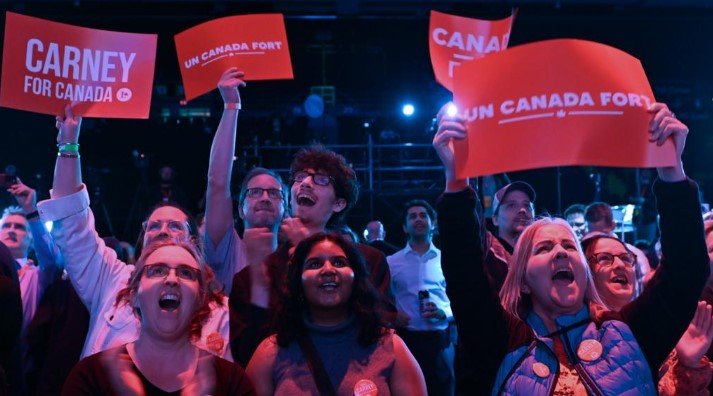Introduction: A Dramatic Political Shakeup in Canada
Surprisingly, the 2025 Canadian federal election results—held on April 28, 2025—showed the country’s political moods have dramatically changed. Heated arguments on inflation, housing, and even climate change problems, alongside Indigenous reconciliation and instability on the international scale, drove Canadians to seek change. Bearing all this in mind, what transpired was a remarkable election that paves a new path for Canadian politics for eons to come.
Liberals Lose Majority, Retain Minority Government
The Liberal Spell of Prime Minister Justin Trudeau’s government was cut short as they lost the majority. Trudeau’s set of the Liberal Party now holds on to 142 seats, well below the 170 needed to govern solo. Nonetheless, they remain the primary faction in the Commons and will form a new minority government. Expecting his constituent voters for the fourth time, Trudeau now embraces the message of needing reform, more clearly defined steps of action, and diverse methods, stating that change was always the answer.”
The Liberals, in keeping with their party name, suffered a loss in critical battleground areas while retaining leadership, particularly in suburban Ontario and some Atlantic Canada regions. Significant improvement in voting driven by issues, especially from younger and first-time voters, broke many traditional party lines.
Surging Conservatives, But Just Falling Short Nonetheless
Pierre Poilievre’s Conservative Party made major strides, increasing its seat count by more than 20, up to 135 seats. The Conservatives seized much of the Western provinces and expanded to the outer fringes of metropolitan areas, all under the banner of fiscal conservatism, energy self-sufficiency, and anti-inflationism.
Poilievre built the housing policy framework of his campaign around a class-mobilizing strategy, vowing to slay federal overhead and “give control back to Canadians,” restoring decades-high levels of housing affordability, incentivizing home buying, and eliminating carbon taxes. Despite not winning an outright majority, his party now forms the official opposition and is in a robust position to confront government decisions during the next parliament session.
NDP Retains Balance of Power
Under Jagmeet Singh, the New Democratic Party (NDP) finished with 36 seats—an increase from 2021. Though not a significant increase, the NDP once more occupies the role of a kingmaker, holding the balance of power. Early indications suggest the Liberals are looking to renew cooperation with the NDP to ensure parliamentary stability.
Singh has publicly laid out certain preconditions, which include the adoption of a national pharmacare policy, enhanced protections for tenants, and policies aimed at reducing economic disparity to extend his support. The NDP continues to do well with younger urban voters, especially in British Columbia, Toronto, and parts of Quebec.

Bloc Québécois Holds Ground in Quebec
Yves-François Blanchet’s Bloc Québécois suffered minimal losses in their Quebec stronghold, retaining 27 seats while surrendering three seats to the Liberals and the NDP. Despite this small drop, the Bloc remains an important voice for Quebec’s nationalist politics, especially on issues like the language law, secularism, and provincial sovereignty.
Blanchet reinforced that Quebec’s identity needs to be considered in every national policy framework and that his party would keep advocating for sociocultural policies designed for Quebec.
Greens Make Modest Gains
Under the leadership of Elizabeth May and Jonathan Pedneault, the Green Party of Canada appears to have shown some signs of life by winning four seats, a modest yet hopeful increase. Their call to action regarding climate change, reconciliation with Indigenous peoples, and oversight of big corporations was particularly popular among voters on Vancouver Island and parts of Prince Edward Island.
While this increase has improved their leverage and visibility in the House Greens are still unable to enact significant change to large-scale legislation.
Historic Firsts and Independent Successes
This election also brought remarkable milestones:
An independent candidate from Nunavut won and became the first Indigenous woman MP after defeating her Liberal opponent on reconciliation, language preservation, and remote community healthcare.
The youngest MP ever elected in Ontario at 22, for the NDP.
A record number of candidates from racialized and LGBTQ+ backgrounds were elected, further diversifying the pool of candidates in Canadian federal elections.
These developments provide hope that Canada’s Parliament is becoming more representative of its citizens and responsive to the calls for increased representation and grassroots leadership. Critical Topics that Shaped the Election
The 2025 election results were influenced by a housing crisis, inflation as well as economic growth, healthcare, climate change, energy, privacy, along AI regulation. All social topics combine the social issues dividing voters by political parties and deepen the support or opposition from constituents.
Housing Crisis: There was deregulation alongside private incentives presented as the solution to unlock public and private funds, along with alternative incentives proposed by the NDP, who wished for publicly funded housing to be put into action and made immediately available. They strongly opposed Conservative and Liberal policies concerning housing capital adoption.
Inflation and The Economy: Conservatives during debates placed the blame on fiscal mismanagement, whilst the Liberals stuck to claiming economic pressure from outside Canada was a main reason for subdued economic growth. Grocery bills, fuel prices, alongside taxes imposed on small businesses took center stage.
Healthcare: Post-pandemic, there was a public drive to improve social infrastructure, which came to be known as the post-pandemic building boom. This term indicates the New Democrats advancing the inclusion of dental care into the public system.
Climate Change and Energy: The Liberals, as well as the Greens, bashed the slack nature of climate policies by perpetuating unresolved questions dealing with global warming. It’s no question as to what motivated the Wildfire and flood crises, harsh climate consequences also led voters to these decisions, conceding periodical soft approaches unrivaled by Conservatives, who couldn’t pull from these sabbatages.
Privacy and AI Regulation: The formation of uncontrolled virtual infrastructure, as well as onwards stimulation technologies, focuses on licensing legislation risks concern for twenty twenty-five amongst youth voters.
Summary of Significant Events
Ontario: Remains politically fractured; Liberals captured the GTA, Conservatives won the outer suburbs and rural regions, and the NDP made some gains in the university towns.
Alberta and Saskatchewan: Predictably blue; Conservatives swept most ridings defending the pieces of federal overreach and carbon tax.
British Columbia: Gaining competition with liberals retaining Vancouver, NDP holding the coast, and the conservatives making gains in the interior.
Quebec: Concentrated Bloc-Liberal competition with NDP surprise gains in the more progressive ridings.
Atlantic Canada experienced a shift as multiple seats changed from Liberal to Conservative or NDP due to growing economic discontent.
Future Coalition Strategies and Uncertain Partnerships:
Trudeau’s Liberals will need to seek additional partnerships with other political parties to pass key legislation to pass, given the fragmented Parliament and lack of outright majority. There is considerable speculation about whether the NDP will formally step into a coalition agreement or keep their support on an issue-by-issue basis.
That said, the unpredictable environment can either be the impetus for bipartisan cooperation or create a legislative standstill. A good amount of the responsibility rests on the effectiveness with which the parties balance commitments to ideology with the need to deliver tangible outcomes.
Table of Contents
A Changing Canada
The outcome of the 2025 Canadian federal election heralds a fresh chapter of coalition politics, as new civic parties have emerged and displayed remarkable political activity. Although the Liberals and Conservatives continue to wield substantial authority, their unchallenged dominance has shifted. It is evident that citizens are prepared for fresh ideas, equitable frameworks, and enhanced inclusivity.
With external threats escalating and internal fractures consolidating, the governance of our nation is positioned as one of the most demanding undertakings in history. The challenges posed by the new Canada are uncharted, and the fresh parliament will have to approach the future of navigating it wisely, together, and resolutely.



